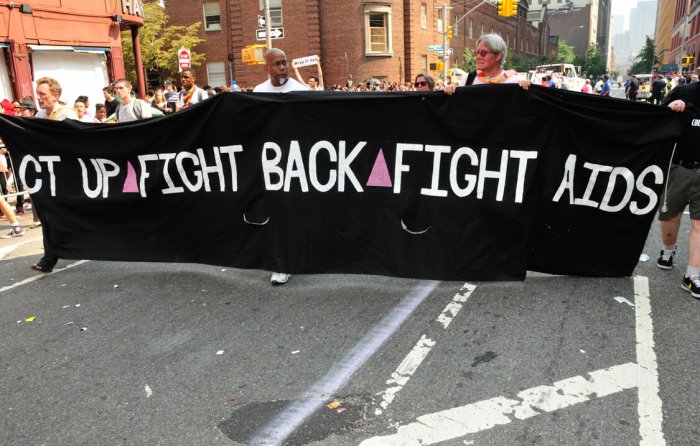State Senator Tom Duane, appearing at Queens Pride the day before he announced his retirement. | DONNA ACETO
At his June 4 press conference announcing retirement from public service after more than two decades, State Senator Tom Duane dedicated his final months in office to securing enactment of a rent cap for thousands of New York City tenants living with AIDS –– a goal that he, West Village Assemblywoman Deborah Glick, and advocates have been pushing for since the Pataki administration.
But just ten days later, in a 27-26 vote, the Senate may well have put Duane’s cherished aim out of reach for the remainder of his time in Albany.
In a telephone interview with Gay City News several days after the failed vote, Duane was angry and bitter, not only that he was undone by Mayor Michael Bloomberg, who has long been on record in opposition to the rent cap, and set up by longtime colleagues on the Republican side, but also that in his view the key player in killing the bill was the Democratic governor, Andrew Cuomo.
“This is what I believe happened. I believe Bloomberg’s lobbyists called Bloomberg, who called Cuomo,” Duane said. Then referring to the Republican Senator majority leader, Dean Skelos, Duane added, “Cuomo called Skelos and said, ‘I don’t want to veto this.’” Instead, Republicans who had supported the measure in past Senate sessions –– and even in the Rules Committee moments before –– walked away from the bill.
“Governor Cuomo asked Dean Skelos to do his dirty work,” Duane charged.
Neither the Republican majority leadership nor the Democratic minority offered support for Duane’s account of what was certainly a confused scene in the Senate, where bills almost never come to the floor unless they are assured of passage. Advocates who have worked on the measure for years were similarly unaware of any role played by the governor, and one cast doubt on whether the administration’s alleged action that day was consistent with its ongoing cooperative efforts with rent cap supporters. Neither the governor’s office nor the mayor’s office responded to requests for comment.
The rent cap legislation would close an anomaly in housing aid to certain clients of the city’s HIV/ AIDS Housing Administration (HASA), by providing sufficient support so that their out-of-pocket rents are no more than 30 percent of their monthly income. Such a cap already exists for tenants in public and congregate care housing. A 2010 estimate by VOCAL-NY, a group that does political organizing among HIV-positive people, found that as many as 11,000 people could be affected by the rent cap legislation.
Advocates argue that without rent protection, many HASA clients pay as much as 70 percent of their income on rent and are left with just over $350 each month –– or about $12 a day –– to provide for their other needs.
At his retirement press conference, Duane had pledged to “fix a policy that is incredibly cruel, that impoverishes the people who are sickest with AIDS.”
The consistent sticking point on enacting a measure that on its face has such humanitarian appeal has been its cost. Advocates maintain the measure would be cost-neutral or actually save money, with reduced emergency shelter costs and less need for emergency room visits by those who lose their homes. The City Council, which several years ago passed a unanimous resolution in support of the cap, has been a bit less bullish, estimating first-year start-up costs of around $4 million, but with little or no additional net cost after that.
Those analyses, however, have never been accepted by the Bloomberg administration, nor were they persuasive to the Paterson administration. Several years ago, City Hall produced an analysis showing annual costs of $31 million, divided evenly between the city and state. It also noted that up to $193 in a special allowance for nutrition and transportation and $200 in food stamps are available monthly to HASA clients. Finally, the mayor’s analysis worried about establishing “an expensive precedent.”
“No other population in receipt of public assistance in private housing has their rent contribution capped at 30 percent,” an administration memo read. The Duane-Glick bill would be the first to predicate housing assistance “solely on a medical diagnosis.”
Advocates have responded that the mayor’s efforts to cast the legislation as a dangerous precedent overlook the limitations that apply to rents paid by HASA clients in public housing.
In 2010, both the Assembly and the Senate approved the rent cap legislation, but Paterson, in a decision he clearly recognized was at odds with his traditional progressive base, vetoed it, saying that his administration could not get comfortable that it would cost any less than $20 million a year.
Since last year, with a new governor and a record of passing the bill several times in each chamber of the Legislature, advocates had been upbeat about the prospects for finally achieving their goal.
When Cuomo, early in his tenure, established a Medicaid Redesign Team (MTR) to improve the efficiencies of New York’s participation in the joint state-federal health care program for low-income Americans, the Affordable Housing work group, which included several leading AIDS advocates, suggested that the rent cap provisions be folded into the governor’s overall restructuring. Bloomberg’s representatives opposed that in public hearings, and the recommendation did not make it into the governor’s fiscal year 2013 budget proposal (though $60 million was set aside for the MTR’s Affordable Housing Fund) and, so far, is not a part of his Medicaid 1115 “super waiver” application to the federal government.
Carmelita Cruz, the director for New York State public policy and organizing at Housing Works, an AIDS services organization, said that incorporating the rent cap into the governor’s Medicaid overhaul will be a major focus of its advocacy going forward. With no concrete progress on that front, however, supporters of the cap continued to press for its passage as a stand-alone measure.
According to Duane, the decision to bring the rent cap bill to the Senate floor on June 14 came as a surprise to him, and, in fact, the Senate website indicated that action on the measure was originally set for June 18. At some point on the 14th, Republican colleagues began congratulating him, saying they understood his bill would be approved by the Senate that day –– behavior one advocate described as “Judas kisses.”
When the Rules Committee, customarily the last stop on a bill’s journey to floor consideration, took up the measure, it breezed through on a 16-1 vote.
“Of course I was happy that it flew through the Rules Committee,” Duane said. “But it’s a total aberration that a bill that flies through does not pass.”
When asked if that had ever happened, Scott Reif, a spokesman for the Senate Republican majority, said he didn’t know. “There aren’t a lot of bills that are defeated on the floor,” he explained.
Reif and Duane offered different accounts of how the defeat played out on the Senate floor. As Duane saw the vote going against him, he asked that he be allowed to withdraw the roll call and put consideration of the bill off for several days. That account is borne out by the official debate transcript, which has Duane, supported by Democrats Daniel Squadron and Neil Breslin, unsuccessfully arguing that a sponsor has the prerogative to pull a bill at any point in the process. After extended argument between the three Democrats and several Republicans, Duane said he no longer wanted to delay the vote.
Reif said that Skelos’ counsel approached Duane on two separate occasions and offered him the chance to pull the bill, only to be rebuffed. According to Duane, however, the conversations he had with top Republicans as this played out were marked by disingenuous behavior on the GOP’s part. He accused Deputy Majority Leader Tom Libous of “lying” to him and said Skelos would not come out of his office or take a phone call from him.
“Senator Skelos never told me why he killed the bill,” Duane said. “He was ashamed to tell me what he was doing.”
According to Mike Murphy, a spokesman for the Democratic minority, Duane finally gave up in his effort to forestall a vote when he realized that Republicans had set him up and would work to defeat the measure even if it were held over until the following week.
Duane made much of the fact that 19 Republicans who had voted for the bill in 2009, when it was approved 52-1, voted no this year. However, when it was taken up again in 2010, the vote was much closer –– 42-19. Only five of the Republicans who voted no last month had supported it in 2010. It’s worth noting, though, that four of the six Republicans present in the Rules Committee who voted to move the bill to the floor ended up voting no, including Skelos.
Duane was less interested in talking about the eight Democrats who were either excused or absent from the vote. Had they been present and voted yes, the measure would have been approved.
“Was there incompetence on the part of the Democrats? Yes,” he said. “Do I think they were in on the scheme? No.”
The GOP’s Reif pointed to the eight missing Democrats as one reason why Duane cannot cry foul. His Democratic counterpart, Murphy, however, said the defection of former Republican supporters of the bill proved that the vote was rigged. Had more Democratic supporters been on hand, he argued, fewer Republicans would have stuck with their earlier yes votes.
Cruz didn’t see the matter that way.
“Housing Works has always seen this as bipartisan,” she said, stating there has been a solid core of Republicans who were strong in their support. “This made the Democrats seem disorganized and messy. It is not the first time the Republicans have done this to the Democrats.”
Not that the group has any respect for the way the Senate majority acted.
“This vote represents the worst kind of nasty and inhumane politics that is currently in play in Albany,” said Terri Smith-Caronia, vice president for advocacy and public policy at Housing Works. The flight of Republicans away from the bill, she said, “proves that they are willing to deploy the most egregious and Machiavellian power plays in their quest to further brutalize the poor and ill.”
VOCAL-NY was similarly critical of the Republicans’ willingness to kill the bill. Alluding to the former governor’s veto, James Lister, a VOCAL member who has been particularly active in the advocacy effort, said via email, “Taking leadership lessons from former Governor David Paterson, these turncoats have shown their word is worth nothing and they happily renege on their commitment to affordable housing for homeless New Yorkers living with HIV/ AIDS.”
Sean Barry, a director at VOCAL-NY, and Cruz agreed that Bloomberg’s lobbyists made a final push to defeat the bill as the vote came up –– like Duane, they said Republican senators were seen reading a pink opposition memo distributed by City Hall. Neither, however, had heard anything about Cuomo’s efforts, if any, that day.
“That’s not what we’ve been hearing from the governor,” Cruz said. “They seem to be working on it, trying to settle on the numbers” to use for budgeting purposes. She sounded upbeat that a rent cap might yet make its way into Cuomo’s Medicaid reform effort.
Barry offered one other ray of hope. Duane has refiled the bill with different effective date provisions, enough of a change to allow for Senate consideration again should a special session be called after the November election. Such a vote, if it happens, would come well past the eleventh hour in Tom Duane’s Senate career.


































